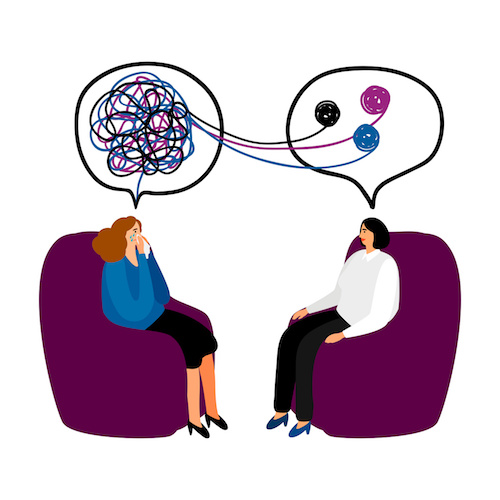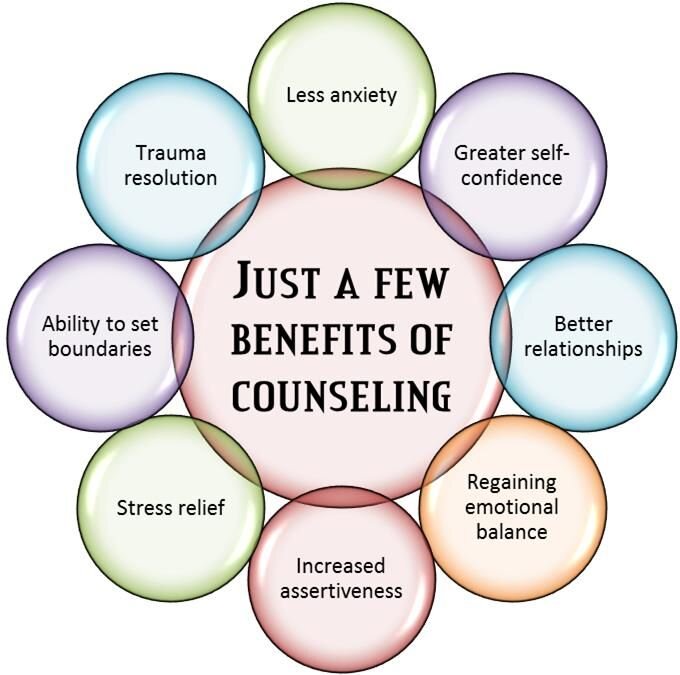Unlocking the Keys of Mental Wellness: A Review of Counseling and Treatment Alternatives
Psychological health and wellness is a facility and critical aspect of total well-being. Countless therapy and therapy alternatives exist to resolve various psychological challenges. Each strategy provides one-of-a-kind advantages and methods tailored to individual needs. Comprehending these alternatives is important for any individual seeking to improve their mental health. Cognitive Behavioural Therapy. What factors should one consider when exploring these avenues? The answer may reveal a course to a healthier mood
Understanding Mental Wellness and Its Relevance
Mental health encompasses the emotional, emotional, and social well-being of individuals, considerably influencing just how they believe, feel, and act. Its relevance can not be overstated, as it influences every element of life, including partnerships, work performance, and overall lifestyle. Individuals with great mental health often tend to deal with stress a lot more effectively, maintain much healthier partnerships, and make informed choices. Conversely, poor psychological wellness can cause psychological distress, damaged functioning, and different mental disorders, which might call for professional treatment. Understanding psychological health is important for identifying the indications of distress and the need for assistance. Recognition additionally promotes empathy and minimizes stigma, encouraging people to seek assistance when necessary. By focusing on psychological health and wellness, areas can promote atmospheres that support psychological well-being, eventually resulting in much healthier, much more durable people. This structure serves as an essential action towards efficient psychological wellness counseling and therapy options.
Sorts Of Counseling Methods
Counseling approaches vary widely, each customized to satisfy the special requirements of individuals looking for support. Amongst one of the most common kinds are cognitive-behavioral therapy (CBT), which concentrates on identifying and altering adverse idea patterns, and person-centered treatment, which stresses compassion and approval. Psychodynamic treatment checks out past experiences and unconscious procedures to recognize current habits, while solution-focused quick treatment aims to recognize solutions as opposed to check out problems.Additionally, household treatment addresses relational dynamics and interaction within families, cultivating much healthier interactions. Team therapy offers a common area for individuals to share experiences and sustain one another. Other techniques consist of existential therapy, which motivates people to locate definition and function, and art or music therapy, which utilizes creative expression as a therapeutic device. Each technique uses distinct strategies and ideologies, allowing clients to discover one of the most suitable approach for their personal growth and recovery journeys.
Checking Out Different Treatment Techniques
In the domain name of mental health therapy, various therapy modalities supply distinct methods to therapy. Cognitive Behavior modification highlights the link in between behaviors and ideas, while Psychodynamic Treatment explores unconscious influences on emotional well-being. In Addition, Mindfulness-Based Strategies advertise present-moment awareness as a means to improve psychological guideline and general mental wellness.
Cognitive Behavior Modification
Cognitive Behavior Modification (CBT) stands out as one of one of the most extensively exercised and investigated methods in psychological wellness treatment. This approach concentrates on the affiliation in between behaviors, ideas, and feelings, stressing that changing unfavorable idea patterns can cause enhanced emotional health and behavioral modifications. CBT is structured, commonly entailing a limited variety of sessions, and intends to gear up people with functional skills to manage their signs. It works for a selection of conditions, consisting of anxiousness disorders, depression, and trauma. By using methods such as cognitive restructuring and exposure therapy, CBT fosters durability and equips customers to confront difficulties head-on, making it a useful alternative in the landscape of mental wellness treatments.
Psychodynamic Therapy Methods
Psychodynamic therapy techniques use a deep exploration of the unconscious mind and its influence on habits and emotional health. Rooted in Freudian theory, these methods emphasize the significance of very early youth experiences and subconscious conflicts. Through methods such as cost-free association, desire evaluation, and transference, people acquire insight into their sensations and thoughts, promoting self-awareness and understanding. This restorative method motivates clients to uncover repressed feelings and unsettled concerns, which can be critical in attending to present emotional obstacles. By analyzing the interaction in between previous experiences and existing habits, psychodynamic treatment aims to advertise emotional recovery and individual development. Inevitably, it provides a framework for people to check out intricate internal characteristics that influence their psychological health and wellness.

Mindfulness-Based Methods
While typical therapies often concentrate on past experiences, mindfulness-based methods prioritize present-moment awareness as a pathway to emotional wellness. These strategies, consisting of mindfulness-based cognitive therapy (MBCT) and mindfulness-based stress and anxiety reduction (MBSR), urge individuals to involve totally with their ideas and feelings without judgment. Professionals discover to observe their frame of minds, cultivating a higher understanding of psychological triggers and actions. This practice not just relieves signs of stress and anxiety and anxiety but also enhances total psychological durability. By incorporating mindfulness workouts, such as meditation and deep breathing, clients cultivate a feeling of peace and clarity. Ultimately, mindfulness-based techniques equip people to browse life's challenges with raised recognition and approval, advertising a much healthier partnership with their ideas and emotions.
The Role of a Therapist or Therapist
A knowledgeable specialist or therapist plays an important role in sustaining individuals through their mental health trips. They provide a safe, non-judgmental room where clients can reveal their thoughts and feelings honestly. Marriage Counselling. By employing various healing methods tailored to every individual's needs, therapists help clients explore underlying issues that might add to their mental health challenges.Therapists supply guidance and tools to deal with stress, anxiety, anxiety, and other psychological troubles. Their training go now equips them to recognize patterns in habits and believed procedures, helping with insights that result in personal growth. They also promote a strong therapeutic partnership, which is crucial for successful outcomes.Moreover, specialists remain committed to confidentiality and moral requirements, ensuring a relying on environment. Ultimately, the duty of a specialist or counselor is to empower people, encouraging them to develop durability and healthier coping strategies while guiding with life's complexities
How to Select the Right Counseling or Therapy Alternative
Choosing the right counseling or therapy option begins with evaluating specific demands. It is important to comprehend individual challenges and objectives before discovering different therapy designs. This foundational action can significantly affect the performance of the selected strategy.
Analyze Your Demands

How can individuals efficiently examine their mental health requires when reviewing therapy or therapy choices? They must mirror on their psychological state and determine specific issues, such as connection, anxiety, or anxiety difficulties. Journaling can be a beneficial tool for tracking thoughts and feelings over time. In addition, people might take advantage of looking for comments from relied on good friends or member of the family relating to perceived adjustments in behavior or state of mind. It is likewise valuable to evaluate personal objectives for therapy, such as boosting coping skills or acquiring insight into individual patterns. Researching different therapy methods and their viability for certain requirements can aid in making an enlightened option. Eventually, self-awareness plays a crucial role in picking the appropriate path for psychological health and wellness support.
Discover Treatment Styles
While traversing the varied landscape of therapy options, individuals must consider numerous designs of counseling to locate the best fit for their special requirements. Cognitive Behavior Modification (CBT) concentrates on altering negative thought patterns, while Psychodynamic Treatment discovers subconscious procedures and previous experiences. Humanistic methods stress personal growth and self-actualization, cultivating a helpful environment. Additionally, mindfulness-based therapies grow present-moment recognition, aiding psychological policy. For those looking for framework, Solution-Focused Short Treatment targets particular objectives and options. Group therapy gives a communal setup for shared experiences and assistance. Ultimately, individuals should assess their choices, comfort levels, and details difficulties, ensuring they select a healing design that resonates with their personal journey toward psychological health.
Overcoming Obstacles to Looking For Aid

The Benefits of Counseling and Treatment for Psychological Health
Looking for aid for psychological health and wellness challenges can result in substantial improvements in general well-being. Therapy and therapy give individuals with a safe room to explore their thoughts and feelings, promoting view publisher site self-awareness and individual growth. These professional services furnish customers with coping strategies and problem-solving skills tailored to their special situations.Moreover, treatment can decrease signs and symptoms of anxiousness, clinical depression, and other psychological wellness conditions, improving emotional durability. Routine sessions promote liability and urge people to establish and achieve personal objectives. With different therapeutic methods, such as cognitive-behavioral therapy or mindfulness practices, customers find out to reframe adverse ideas and create healthier behaviors.Additionally, the restorative connection itself can be a resource of support, helping to fight seclusion and isolation. Overall, taking part in therapy and treatment is a positive action towards accomplishing psychological wellness, allowing people to lead even more meeting lives.
Frequently Asked Inquiries
For How Long Does Counseling or Therapy Commonly Last?
The period of therapy or treatment differs substantially, usually lasting from a few sessions to a number of months or years. Variables influencing this include the individual's specific demands, the kind of therapy, and healing goals.
What Should I Expect During My Initial Session?
During the first session, individuals can expect an intro, discussion of problems, and the therapist's strategy. They may complete evaluations and develop goals, fostering a secure environment for open redirected here communication and building relationship.

Are There Any Risks Related To Treatment?
Treatment can involve threats, such as psychological discomfort, vulnerability, or challenging agonizing memories. While these challenges may emerge, they can likewise bring about individual development and healing, making the therapeutic process facility yet possibly rewarding.
Exactly How Can I Inform if My Therapist Is a Good Fit?
Establishing if a specialist is a good fit includes assessing convenience, interaction design, and healing approach. Favorable relationship and progress in the direction of goals are indications of a suitable match, necessary for efficient mental health and wellness assistance.
Will My Insurance Policy Cover Therapy or Treatment Procedure?
Figuring out insurance policy coverage for counseling or treatment sessions typically needs getting in touch with the insurance supplier directly. Plans differ considerably, so individuals should validate advantages, co-pays, and any kind of needed pre-approvals before seeking therapy solutions. Amongst the most usual types are cognitive-behavioral treatment (CBT), which concentrates on identifying and altering unfavorable thought patterns, and person-centered therapy, which highlights empathy and acceptance. Psychodynamic therapy explores past experiences and unconscious processes to recognize current habits, while solution-focused quick treatment intends to determine services instead than examine problems.Additionally, household therapy addresses relational dynamics and interaction within family members, fostering much healthier communications. Other methods include existential therapy, which encourages people to find meaning and purpose, and art or songs treatment, which makes use of imaginative expression as a restorative device. Cognitive Behavior Therapy emphasizes the link in between habits and ideas, while Psychodynamic Therapy discovers subconscious impacts on emotional wellness. Cognitive Behavior Therapy (CBT) focuses on transforming negative idea patterns, while Psychodynamic Treatment explores unconscious procedures and previous experiences.